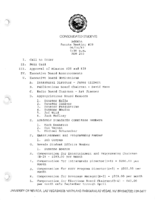Search the Special Collections and Archives Portal
Search Results

Transcript of interview with Rosina Goodwin by Bruce Eubank, March 15, 1978
Date
Archival Collection
Description
On March 15, 1978, Bruce Eubank interviewed Rosina Goodwin (born 1918 in Sweet Springs, Missouri) about her life in Las Vegas, Nevada. Goodwin first talks about her family background before discussing the Las Vegas Strip, the Stewart Ranch, and Twin Lakes. She also talks about schools, Boulder Dam, the atomic testing, and her work as a telephone operator. The latter part of the interview includes discussion on changes in Las Vegas, the Helldorado Parade, and changes in weather.
Text

Meeting minutes for Consolidated Student Senate, University of Nevada, Las Vegas, June 14, 1983
Date
Archival Collection
Description
Text

University of Nevada, Las Vegas (UNLV) 6th commencement program
Date
Archival Collection
Description
Commencement program from University of Nevada, Las Vegas Commencement Programs and Graduation Lists (UA-00115).
Text

Transcript of interview with Bruce Woodbury by Claytee White, February 25, 2009
Date
Archival Collection
Description
When Bruce Woodbury, native Las Vegan, attorney, and former county commissioner, looks back on growing up, he immediately says: My first memory of a house here in Las Vegas was in the John S. Park area. The Woodbuiy family lived in two houses in the neighborhood and attended only two schools, John S. Park Elementaiy and Las Vegas High School. Bruce's recollections begin in the 1940s, when they lived on the edge of town. Bruce has what he calls a "nostalgic yearning for the old Las Vegas, even though today it's an exciting, vibrant community in many ways." And during this oral history interview, he recalls the safe feeling of the times—unlocked doors and children allowed to roam more freely than today. The Strip was a "separate world" where kids like himself might go to a show occasionally with their parents, celebrate a prom dance or, as he did, get a part-time job. One of Bruce's jobs included being a busboy at the Flamingo Hotel & Casino where he confesses to learning and
Text

Transcript of interview with Adelaide Robbins by Lisa Gioia-Acres, April 18, 2008
Date
Archival Collection
Description
Adelaide was born in Manhattan, New York to a father who was a pianist and arranger and a mother who was a dancer on Broadway. She grew up as an only child in the theater district where she was exposed to the arts from a young age. Her parents insisted she be well rounded. To that end, she began piano lessons at age six and was frequently taken to museums. Adelaide was always drawn to music and began working professionally by the age of 12. She attended the High School of Music and Art for four years along with others who went on to great fame. While in high school, she earned awards for composition. Her knowledge and abilities of the bass earned her a full scholarship to the Eastman School of Music. All of the jobs she had during high school and college were music related; playing gigs or teaching. While working towards a triple major at Eastman, she felt over-extended and eventually transferred to the Manhattan School of Music who was honored to have a transfer from Eastman. Also because of the extra credits from Eastman, she was able to obtain a master’s degree inside of a year. Adelaide went on the road with Buddy Rich’s band where they played in Chicago and Los Angeles before finding their way to Las Vegas. Adelaide was always the only woman in the band, and there were difficulties of being a woman in the field of mostly male musicians. The band found their way to Las Vegas in 1967. She never realized how well known she was until she arrived in Las Vegas. Adelaide came to Las Vegas on a trial run and ended up staying. The first job she had in Las Vegas was playing solo piano at Guys and Dolls before moving on to playing as a rehearsal pianist for a Broadway show. Over the years, Adelaide played many venues with many famous musicians. She is not hopeful for the future of musicians in Las Vegas, feeling the casino owners would rather replace live musicians with canned music. However, Adelaide’s career is not over as she is still performing for a variety of events. With her two degrees from very prominent music schools, Adelaide feels she may have gone further in career if she had stayed in New York, but she has no regrets about coming to Las Vegas.
Text

Dr. Kathleen Kahn Mahon interview, December 3, 2018: transcript
Date
Archival Collection
Description
In 1980, Sunrise Hospital was looking to provide specialized services for pediatrics. They recruited a young pediatric ophthalmologist named Dr. Kathleen Melanie Kahn Mahon. Intrigued by the opportunity to relocate to Las Vegas, Dr. Mahon became one of the first female pediatric ophthalmologists in the city. Dr. Mahon is a highly accomplished pediatric ophthalmologist: Fellow of the American College of Surgeons, Fellow of the American Academy of Pediatrics, Fellow of the American Academy of Ophthalmology, Fellow of the American Academy of Quality Assurance and Utilization Review Medicine. Raised in Santa Fe, Dr. Mahon is the family historian and recalls parts of the family’s ancestral history through the generations. She speaks of her family’s Jewish immigration from Germany and Austria, and a deep historical legacy in New Mexico, which can be traced to the 1800s. As the Mahon family settled into southern Nevada, community involvement was a high priority for her. Among the local organizations that she devoted much of her time to were the Rotary Club, Ronald McDonald House, and Junior League. Dr. Mahon and her husband William were early members of Congregation Ner Tamid. She recalls both her and her son’s b’nai mitzvahs held at the synagogue. She includes anecdotes of enjoying Las Vegas -- stories that range from knowing respected banker Selma Bartlett to the famous Nat Hart from Caesars Palace.
Text

Louis Richardson interview, July 29, 2016: transcript
Date
Archival Collection
Description
As a youth, contractor Louis Richardson followed opportunities that would take him across the U.S. and to Sierra Leone, Africa. Originally from Charleston, South Carolina, Richardson attend Hampton Institute, in Hampton, Virginia, a historically black college/university (HBCU); there, he majored in construction and engineering and joined the Reserve Officers' Training Corps (ROTC). After graduation and U.S. Army service in Vietnam, he received an offer from U.S. State Department to teach young adults math and construction in West Africa. That experience led him to work for various Housing Authorities in New Jersey, Los Angeles, and finally, in 1978, to Las Vegas. In this interview, Richardson talks about how his early experiences shaped his vision of the types of projects he would undertake. He speaks about his focus on engineering how he came to Las Vegas and of the public works projects in schools, parks, and libraries that came to define his body of work. He explains the bid proces
Text

Transcript of interview with Flora Mason by Barbara Tabach, December 8, 2014
Date
Archival Collection
Description
Flora Mason (1940- ) is a Las Vegas, Nevada philanthropist and community leader. She was born Florica Esformes to a Sephardic Jewish parents who emigrated from Greece to New York. This Mediterranean influence can be seen in the meals she serves for the Jewish holidays. Flora?s grandfather had a pushcart business in New York and her father became a produce broker, which led the family to Miami, Florida. She graduated from high school in Miami and also met Stuart Mason there. The young couple married in 1958. They had been married for 58 years when Stuart passed away in 2012. In this oral history, Flora recalls her life?from witnessing signage that read: no blacks, no dogs, no Jews in the South to meeting her husband while a teenager to raising her three children in Las Vegas. Along the way, she has always found time to form fast friendships and to inspire productive community organizations. v For example, Flora and Stuart founded the Las Vegas Chapter of the Juvenile Diabetes Foundation in 1970. It was a disease that their daughter Deborah had suffered from. They also established the Mason Undergraduate Peer Coach Program at University of Nevada, Las Vegas Libraries in 2006. Flora was the first woman elected by the general membership to serve on the Temple Beth Sholom Board of Directors. She has served on the National Board of Directors of the Juvenile Diabetes Research Foundation, been involved with the Jewish Federation of Las Vegas, the Anti-Defamation League among many other Jewish and non-Jewish community organizations. Flora?s college education began at the University of Miami and focused on completing both her undergraduate and graduate degrees at UNLV, where she majored in English literature. She then became a lecturer in the UNLV English department from 1985 to 1993. Flora and Stuart Mason had three children: sons William and James who joined the family?s successful three-generation commercial construction business Taylor International, and daughter Deborah. In this oral history, Flora shares the joy of being a grandparent, her love of travel, and the opportunities of meeting Israeli dignitaries over the years. She also candidly reflects on dealing with grief and the Jewish rituals surrounding death.
Text

Transcript of interview with Andy Katz by Barbara Tabach, February 16, 2016
Date
Archival Collection
Description
In this interview, Andy Katz discusses his family, his childhood growing up in Las Vegas, and attending UNLV. His parents, Mike and Bea Katz, established Manpower, an employment agency, which Andy served as president.
Andy Katz is the youngest of four children born to Michael and Beatrice Katz. When Andy was a little over one-year-old his family moved from New York City to Las Vegas. During this oral history Andy highlights his family?s background and the entrepreneurial spirit of his father that inspired the move in 1963. By 1964, Mike Katz, Andy?s father, was well-known in Las Vegas for providing an answering service and subsequently for opening the Manpower franchise to serve the growing town. In time, this family business grew and the eldest sons, Bob and Mel opened franchises in Salt Lake City and San Diego, respectively. Andy recalls his steps to joining Manpower in this interview. With great humor and fondness, he describes the friendships he formed in public school, Hebrew school and Jewish youth organizations. Andy easily slipped into active leadership roles; it was a role he would continue during his years at UNLV, where he earned a Business degree and was active with the Alpha Epsilon Pi fraternity. Born Andrew Scott Katz on January 9, 1962, Andy, as everyone knew him, passed away suddenly on February 23, 2016. It was exactly one week after this oral history interview. The scheduled next session was not to occur.
Text

Transcript of interview with Glenn Tredwell by Barbara Tabach, March 4, 2016 and April 14, 2016
Date
Archival Collection
Description
In this interview Glenn Tredwell talks about his business ventures since moving to Las Vegas in 1976. He is able to address the many nuances of technology on the global gaming industry.
Text
